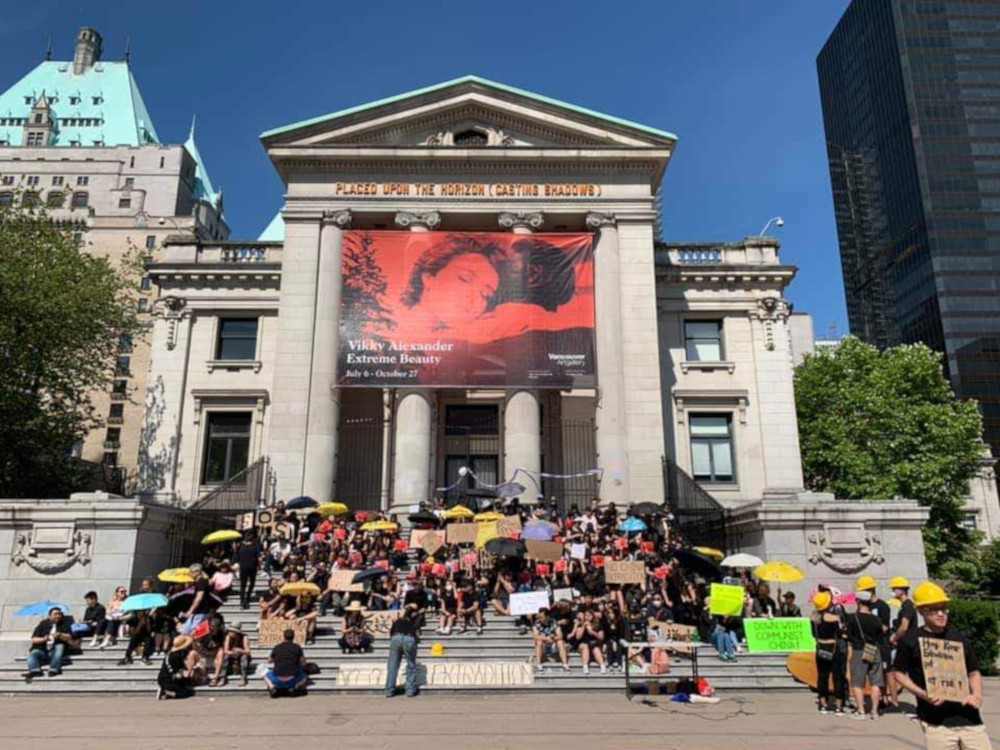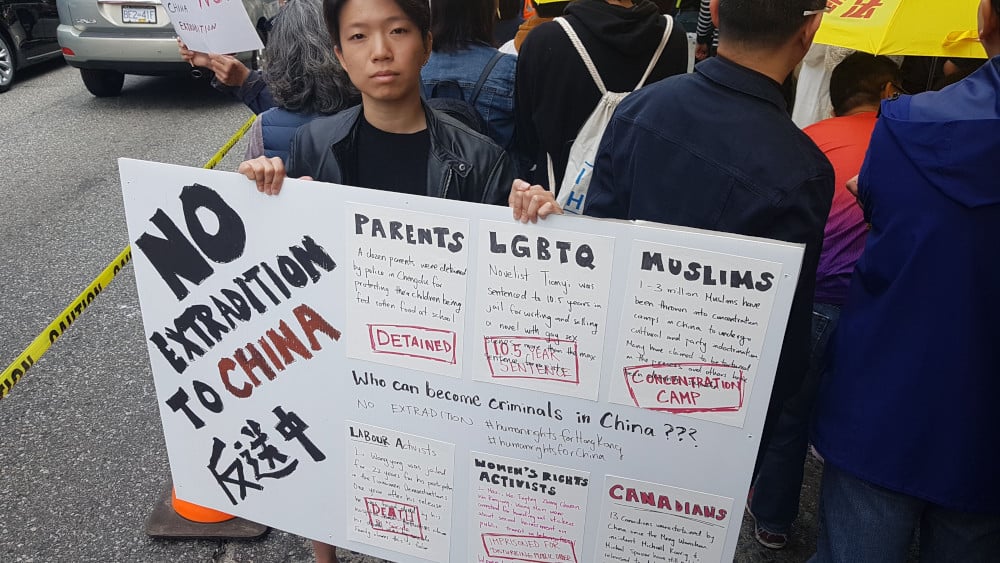“What do we learn when we study the classics? To choose death before injustice, in order to be without regrets.” — Poet Wen Tianxiang
The stories we tell, the histories we pass on, and the heroes we venerate shape the values of our society and culture.
As a Chinese-Canadian, I am proud to carry these histories and values.
And as a Chinese-Canadian queer and trans person, I am deeply concerned about what the erosion of democracy will mean for Hong Kong’s LGBTQ+ community.
In February, Carrie Lam, the chief executive of Hong Kong, introduced a bill that would allow people to be extradited to mainland China and other countries. Up to now, extradition was limited to 20 countries that have extradition agreements with Hong Kong.
Mainland China would abuse extradition power, critics say, using it to punish opponents. Academics and journalists fear further erosion of freedom of speech if China is able to extract political dissidents. Even politically conservative groups have publicly spoken against the bill, and opponents agree that the bill would further erode democracy in Hong Kong.
And any erosion of democracy will make life more difficult for Hong Kong’s already oppressed LGBTQ+ community.
This week marks the 50th anniversary of the Stonewall riots, a pivotal moment in the history of the queer liberation movement. Since then, there have been countless victories and defeats as queer and trans communities fought for their rights globally.
Civil disobedience and protest are invaluable strategies in resistance and seeking civil liberties and rights.
But what happens when activism itself becomes punishable by extradition to a country — like mainland China — with an opaque justice system, where dissidents are known to disappear forever?
The LGBTQ+ community in Hong Kong has already struggled to make any gains in human rights. It has spent years unsuccessfully lobbying for a law to ban discrimination based on sexual orientation and gender identity. Lam has said the time is not right for a public consultation on possible legislation.
Hong Kong’s inability to progress on LGBTQ+ rights stands in stark contrast to Taiwan, which recently became the first country in Asia to legalize same-sex marriage. This contrast is especially painful to the LGBTQ+ community in Hong Kong, because it’s so close to Taiwan culturally in other ways.
The glaring difference between the two ethnically Chinese regions is in their system of government. Taiwan has a truly democratic government system. Hong Kong does not.
It’s not just a matter of the absence of legal protections and rights. Activists struggle to make gains on the public engagement front. The organizers of the Hong Kong Queer Literary Festival have announced that they won’t host the event again next year, as the volunteers are broke and burnt out. (They were also denied grants and government funds through a special “Equal Opportunities” program for disadvantaged communities, because sexual orientation isn’t covered by anti-discrimination laws.)

Discriminatory attitudes that are allowed to flourish in Hong Kong affect me as a Chinese-Canadian queer person. The attitudes there not only affect the attitudes of my extended family overseas, but the Chinese-Canadian community as well. The Stigma and Resilience Among Vulnerable Youth Centre recently studied the impact of sexual orientation and gender identity policies in the Vancouver School Board and found that mental health among queer students had significantly improved. But this improvement was not reflected among students of East Asian descent.
The global LGBTQ+ rights movements have profound impact on the queer community in Canada. Hong Kong and Taiwan, as places with strong academic freedoms and freedom of speech, are influential sources of Chinese-language thought and discourse on gender and queer issues.
As a Chinese-Canadian queer and trans person, I need the LGBTQ+ movement in Hong Kong to flourish and be successful. For that, I need the democratic movement in Hong Kong to be successful.
Millions have marched this month to protest the law. And the movement saw its first death June 15 when a young man, after hanging a large protest banner on a tall scaffold, fell to the ground after standing by his banner for five hours.
Poets, warriors and common people risking their lives to speak for their people is a historical motif in the long history of China. Those martyrs are my ancestors, as are the tyrants who ignored them, the bystanders who didn’t care and the heartbroken people who hold vigil for their heroes for 2,000 years.
You don’t get to choose your ancestors or histories, but you do get to choose what you learn and carry on. From my ancestors, I wish to carry on the courage and love of people that spurred both poets and warriors to speak truth to those in power, even when it cost them their lives. I wish to carry on the memories and sacrifices of those who have lost their lives in their fight for justice.
Culture is not static, and we do get to choose our future.
What is especially hopeful about this particular movement is the solidarity and the unexpected alliances that cross class, religious, political, cultural, and generational lines. The motto of the protest has been “do what you can.” Without a central organizer or visible leaders, two million protesters were able to march the streets in an orderly fashion, supporting each other with water, umbrellas, helmets, and saline solution for those who were teargassed. Volunteers even stayed behind to clean up the trash and recycling left behind.
If I had been left in despair after the failure of the 2014 Umbrella Movement, this latest movement for democracy gives me hope for Hong Kong’s future and my own.
Lam has announced she will suspend the passage of the bill “indefinitely.” But she is ignoring protesters’ demands that it be withdrawn, not delayed. She has also ignored calls for an investigation of police brutality and the release of arrested protesters.
As I wrote this, thousands of protesters surrounded government and police headquarters, and I watched with apprehension. I feared for their safety and I feared the government, instead of addressing their demands, would try to outwait them while making no changes. Eventually, the protesters stood down.
But I still hold strong optimism for the future of Hong Kong and the future of our culture.
This time, in 2019, I want our culture and history to change. This time, I do not want us to acquiesce if our words, spoken from our love of our people, goes unheeded by those in power.
This time, I want us to live. ![]()
Read more: Rights + Justice, Gender + Sexuality, Media















Tyee Commenting Guidelines
Comments that violate guidelines risk being deleted, and violations may result in a temporary or permanent user ban. Maintain the spirit of good conversation to stay in the discussion.
*Please note The Tyee is not a forum for spreading misinformation about COVID-19, denying its existence or minimizing its risk to public health.
Do:
Do not: